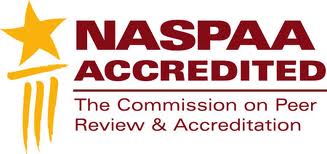Lead the way with an MPA
[1737579385].jpg)
ICMA Student Chapter Members
If you are interested in a degree that complements your career goals and enhances the skills necessary to be a 21st Century leader in government, nonprofit, health, social work, education, or criminal justice, then the NASPAA accredited Master of Public Administration degree is for you.
The MPA degree program consists of a minimum of 39 credit hours for students in a public service career and 42 credit hours for pre-career students. Click here to review the 39-credit hour program. Click here to review internship requirement.
Part-time students who take six credits per semester complete the MPA degree in seven semesters.
Total Cost of Degree. Click here for information on tuition per credit hour and other fees. For scholarship information please visit the PNHA scholarship page. For other financial support and filing for FAFSA, please visit the GVSU Financial Support website.
Percent of students who recommend the MPA program
- Multi-Sector Opportunities. Tailor your degree to fit a career in any sector.
- Flexible Learning. Courses offered in the evening and online.
- Leadership Development. The NASPAA-accredited curriculum builds essential skills to lead, innovate, and inspire.
- Real-World Experience. Impactful internships and projects with community leaders, alumni, and faculty.
- Diverse Network. Connect and network with a vibrant student body, influential professionals, and faculty experts.
- Affordability. Graduate assistantships, scholarships, and credit transfers are available to make the degree more affordable.
Application Information
MPA Degree Requirements
- a bachelor's degree from an accredited college or university
- an undergraduate GPA of 3.0 on a 4.0 scale (transcripts must be submitted)
- a detailed resume
- three letters of recommendation from informed sources
- an essay on career and educational objectives (250-750 words) that demonstrates commitment to community and public service
- GRE scores are NOT required but may be requested in cases where GPA is lower than a 3.0.
- Apply now and start your future today.
Combined BS/MPA Requirements
- cumulative GPA of at least a 3.3 on a 4.0 scale
- junior standing or 75 credit hours, with at least 30 hours completed at GVSU
- completed PNH 520 - Foundations of Public Service, taken during the fifth or sixth semester with a B or better
- resume
- three letters of recommendation
- meet with the MPA Director Dr. Rich Jelier prior to applying to the program.
Application Deadlines
- Apply by August 1 to start in the fall semester (August - December).
- Apply by December 1 to start in the winter semester (January - April).
- Apply by April 1 to start in the spring/summer semesters (May - August).
- Late applications are accepted as space allows.
- The $30 nonrefundable application fee is waived if applied previously to GVSU
Program of Study
The MPA degree consists of a minimum of 39 credit hours for in-service students and 42 credit hours for pre-career students. In-service is defined as having three years of professional experience prior to being admitted into the program. You should visit with a faculty advisor to discuss the program of study prior to registration. (Consult Banner to identify advisor.) Return visits are encouraged, as updating the plan of study likely will be desirable as time passes. Typically, full-time students complete the program in five semesters and part-time students taking two classes per semester complete the degree in seven semesters.
The MPA program has the following components:
- 18 credit hours of required core courses:
- PNH 520 Foundations of Public Service
- PNH 611 Research Methods
- PNH 612 Human Resources in Organizations
- PNH 614 Organization Theory
- PNH 615 Public Financial Administration
- PNH 685 Public Service Leadership Seminar (Culminating Experience, to be taken in the last semester of the program)
- 21 credit hours from one of the following concentrations:
- Nonprofit Management and Leadership
- Policy Analysis, Advocacy, and Evaluation
- State, Regional, and Local Governance
- Criminal Justice
- Health Administration
- Custom options include: Social Work, Ed Leadership, Communications, Water Resource Policy
- 3 credits of internship for pre-career students
MPA Alumni

DeMario Johnson received the David M. Wodynski Memorial Fellowship as a Management Assistant with the City of Long Beach, California.

Shianne Campos is a Regional Marketing Specialist at Mercy Health.

Brady Selner is the Village Manager of the Village of Spring Lake
[1640222840].jpg)
Shannon Cohen is a practitioner faculty member for PNHA and is the principal and Founder of Shannon Cohen, Inc., a consulting firm.

Andrew Claucherty is a Program Specialist at Habitat for Humanity of Kent County.

Hannah (Rogers) Olechnowicz is the Executive Director of the Grand Haven Schools Foundation.
The MPA program is part of the School of Community Leadership & Development within the College of Education & Community Innovation at Grand Valley State University and is accredited by the Network of Schools of Public Policy, Affairs, and Administration (NASPAA). We have held this prestigious designation since 1995. This accreditation certifies that our MPA degree maintains rigor and relevancy for the 21st Century public servant. Learn more about the courses, concentrations, and requirements. Apply now and start your future today.

